Retrospective Review: The Elder Scrolls IV: Oblivion (PC)
- Matthew McCarthy

- Jun 26, 2021
- 9 min read
Updated: Dec 13, 2022
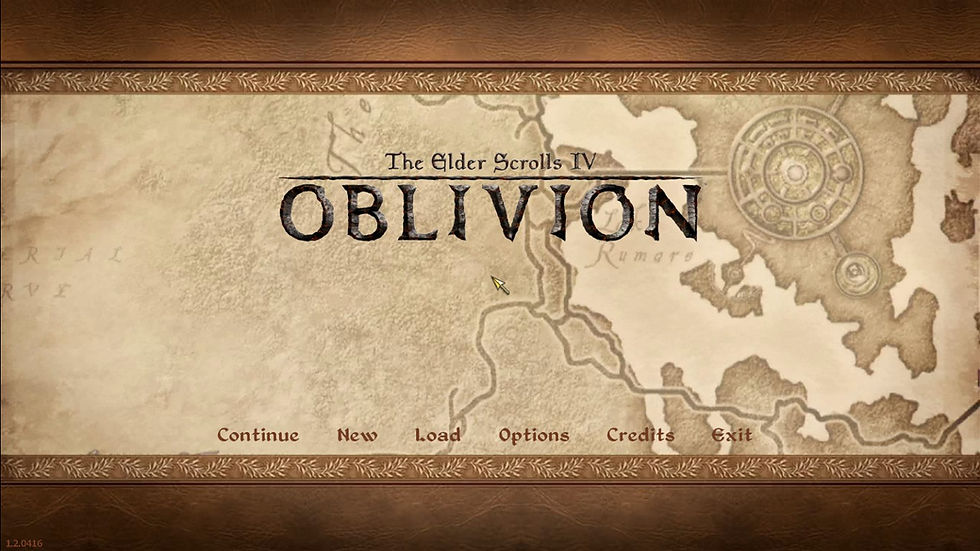
Despite the subtitle being Oblivion, something that is forgotten, this game remains in the hearts and minds of many who have played it.
"The Elder Scrolls V: Oblivion" is the fourth entry in the Elder Scrolls series which you might know better for "The Elder Scrolls V: Skyrim." Oblivion developed and published by 2K Games and Bethesda Game Studios, the latter published the Fallout series. Oblivion came out in 2006 for the Xbox 360 and Microsoft Windows, 2007 for the PlayStation 3.
I played Oblivion in 2011 for the Xbox 360 and remember loving it a lot. It was just so different from what I played at the time. Likely because I never touched a FPS RPG like Oblivion before.
For this review, I’ll be playing the Steam version of the Game of the Year Edition.
Story (A)
The protagonist is a prisoner in Cyrodiil, a province of Tamriel. Tamriel is the mainland where all the Elder Scroll games take place.
The protagonist just so happens to be in the prison cell with a secret exit which the Emperor of Tamriel, Uriel Septim, needs to use to protect his life from assassins.
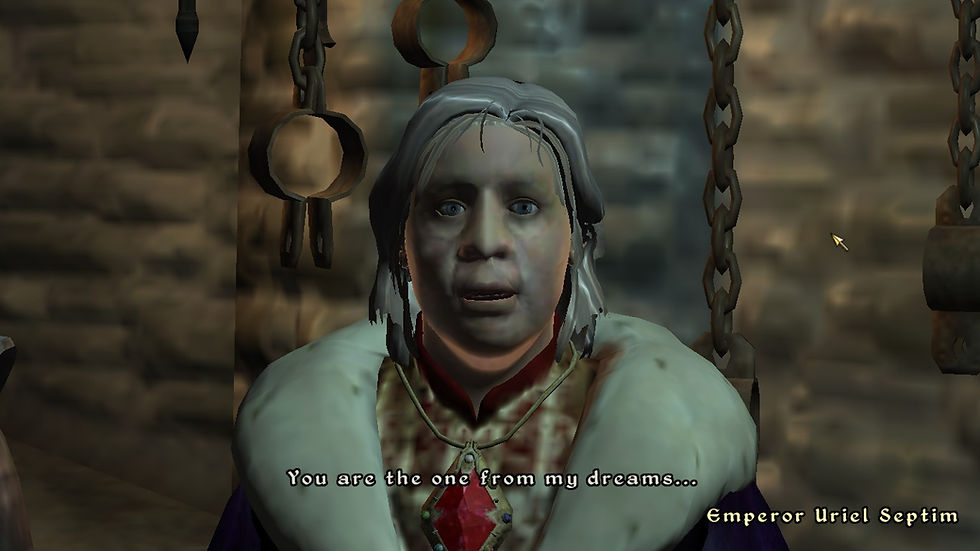
Unfortunately, Uriel has seen the future, he knows he will die. However, he has seen you, the protagonist, saving Cyrodiil from the upcoming crisis in his dreams.
After Uriel dies in front of the player, the player is tasked with finding his son. The player later finds out who the assassins are, what the crisis is and more. The player must stop the crisis to save all Cyrodiil.
The main storyline is good. There is one part in the middle where the story dies down due to fetch quests, but it becomes amazing again in the last three quests.
The main plot is only the beginning though, there are tons of side-quests to do. Like hunting a vampire, making a town go mad, and more.
There are also questlines like the Fighters Guild, Dark Brotherhood and so on with their own storylines.
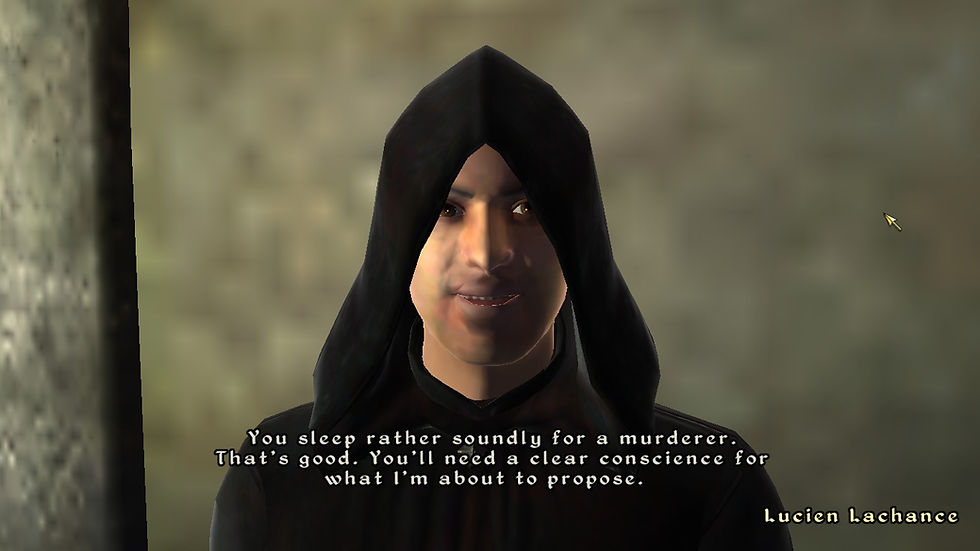
All the questlines have good stories excluding the Arena due to being a series of gladiator battles, although that isn't a bad thing.
These questlines are not perfect by any means. For example, the Dark Brotherhood has an amazing buildup to the climax but it's poorly executed.
Another important aspect of Oblivion’s story are the characters. Uriel Septim, Dar-Ma, Lucien Lachance and Lord Rugdumph are the most notable examples, being likable and interesting.
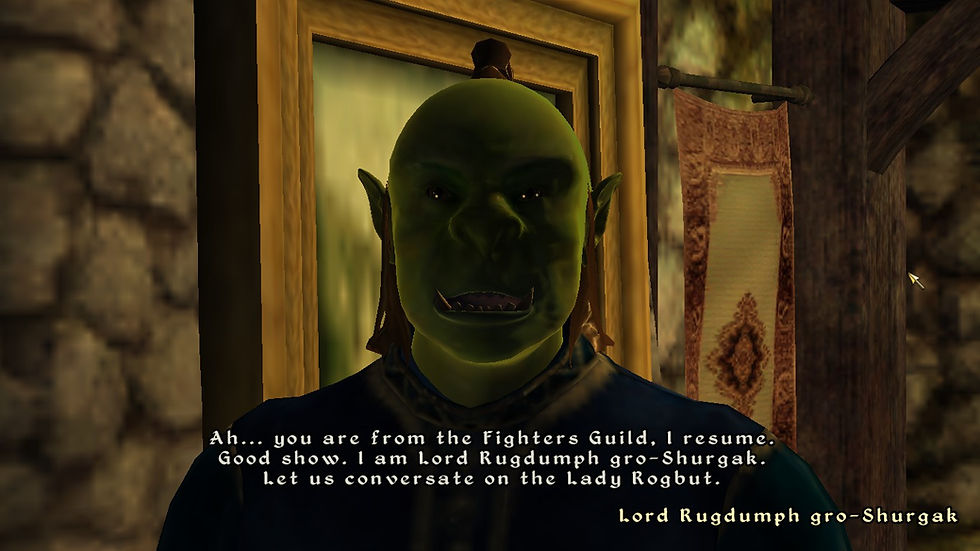
Although, a good portion of the folks in Cyrodiil aren’t much to talk about. Most of them are not important, relegated to basic dialogue, or just don’t have much personality.
The Shivering Isles Expansion is an exception as the characters there are excellent. Almost all of them have interesting personalities since everyone's mad.
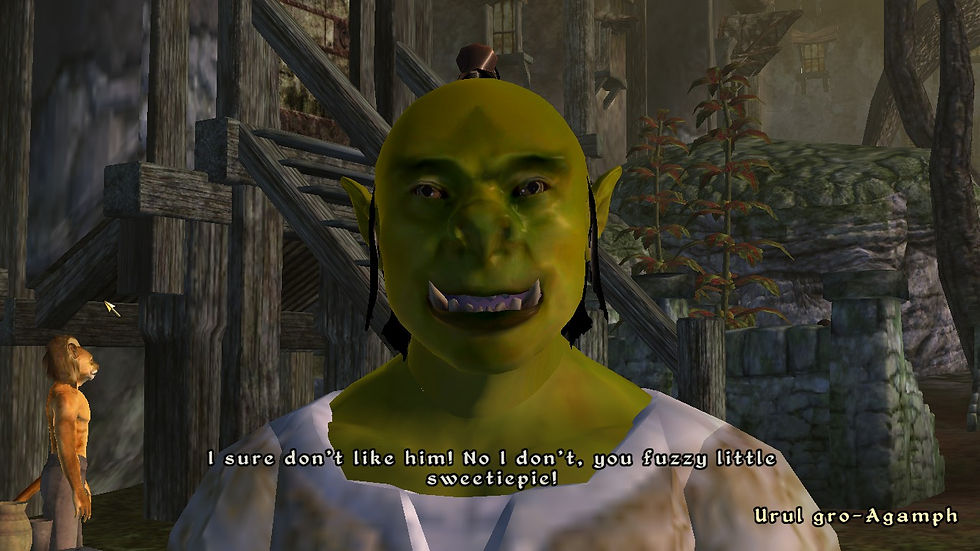
Mad in a good way.
Then there is the world of Cyrodiil/The Elder Scrolls. The cities all have interesting histories; the different factions like guilds and Knights of the Nine are great; the Daedric Princes, who are worshipped as gods by their followers; and more.
The lore and world-building really makes the world feel alive and enhances the gameplay experience.
Presentation (B-)
The game was released in 2006, the same year the Xbox 360 and PlayStation 3 came out. Despite it being 14 years, the presentation still looks nice.
The game nails the visuals. The landscapes and cities are lush and shimmering, dungeons are dark and creepy, and more. The use of colours, bloom and lighting are beautifully done.
Creature design is great too, the Daedra enemies are the coolest looking with the Atronachs and dinosaur-like appearances.
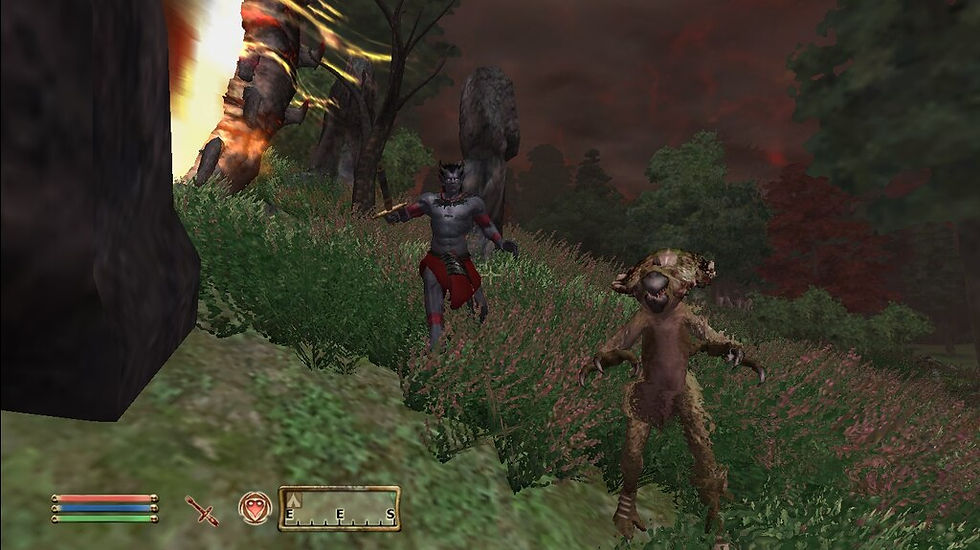
However, the character models don’t hold up. There’s a charm to them, but compared to the Skyrim models of say, a Dunmer, Skyrim’s take on them is more detailed.
The character models do make the races of the NPCs clear though.
The game also has NPCs made with its character creation system. Most characters look fine, but some NPCs look odd.
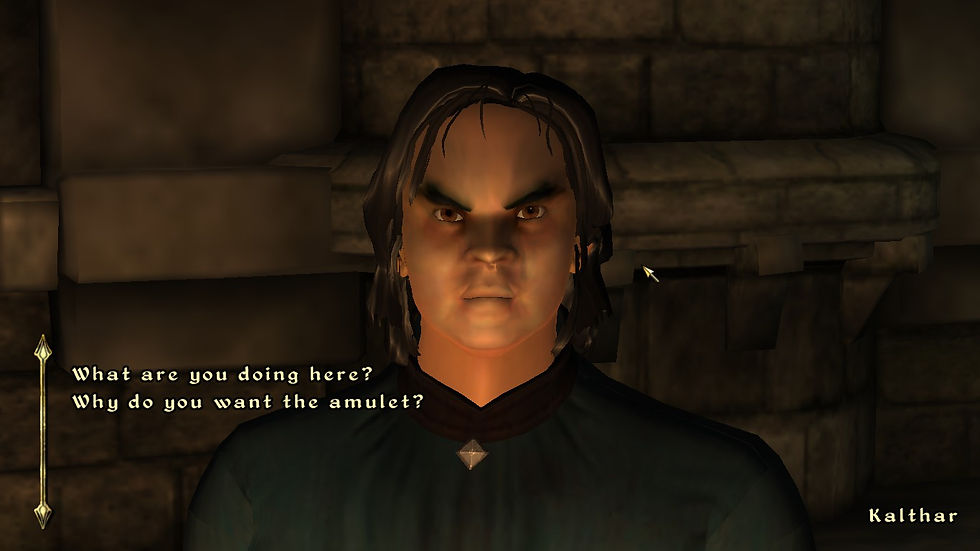
However, one major positive is that computers can run the game well on low graphics. Even on low graphics, the game has immersive visuals.
Audio-wise, the music is amazing. Even after playing over 100 hours of Oblivion, I’m still not sick of it. Whether it’s exploring Cyrodiil, battling foes, or exploring eerie dungeons, Oblivion has fitting tracks for every occasion.
The voice acting can be mixed. Some voice acting can be really good such as the Dremora, but some voice acting is hilariously bad. There are even outtakes present in the game itself, and not as a bonus.
Unfortunately, the biggest problem in Oblivion is the bugs.
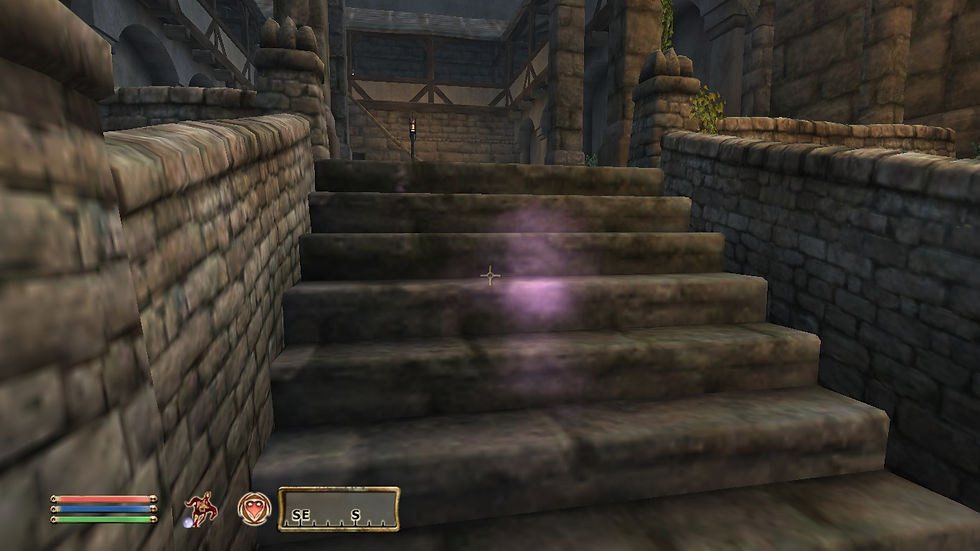
Sometimes the game crashes when fast traveling from one of the cities, some ruins have switches that stop working that hinder progress, a couple of enemies had their animations break, and the sitting animation broke altogether.
These are only a few of the 40+ glitches I ran into, with over over 100 potential bugs.
This is major as some of these bugs can soft lock save files if autosave is used, making the save file unusable. These bugs can also be immersion breaking.
Gameplay (A)
Oblivion is a first-person role-playing game. There is an array of weapons, magic, and stealth to defeat enemies and complete quests to reap the rewards.
At the beginning of the game, the protagonist can choose their appearance and race. There are ten races and each race have bonus perks to them, such as how Argonians can breathe underwater.
The races add replay value and their perks can be handy. Customizing the protagonist’s appearance is also well-executed as there are plenty of options.
Although, some results can be… Cursed.
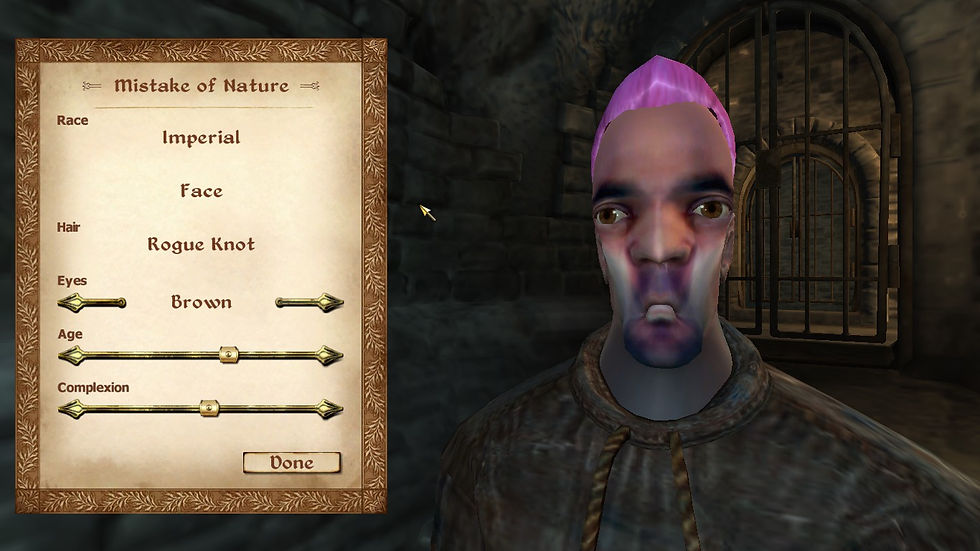
A class can be chosen for the protagonist. Created classes have seven skills assigned to be major skills, which two attributes will receive bonuses and can be named. A class can either be chosen or created. Pre-designed classes have skills chosen already.
Skills when leveled up give special buffs, such as how leveling up Sneak more and more makes stealth easier. These benefits for skills only apply when the 25, 50, 75 and 100 level thresholds are reached.
A birth sign can be chosen as well, which can give unique abilities or bonuses like absorbing magicka or paralyzing enemies once a day.
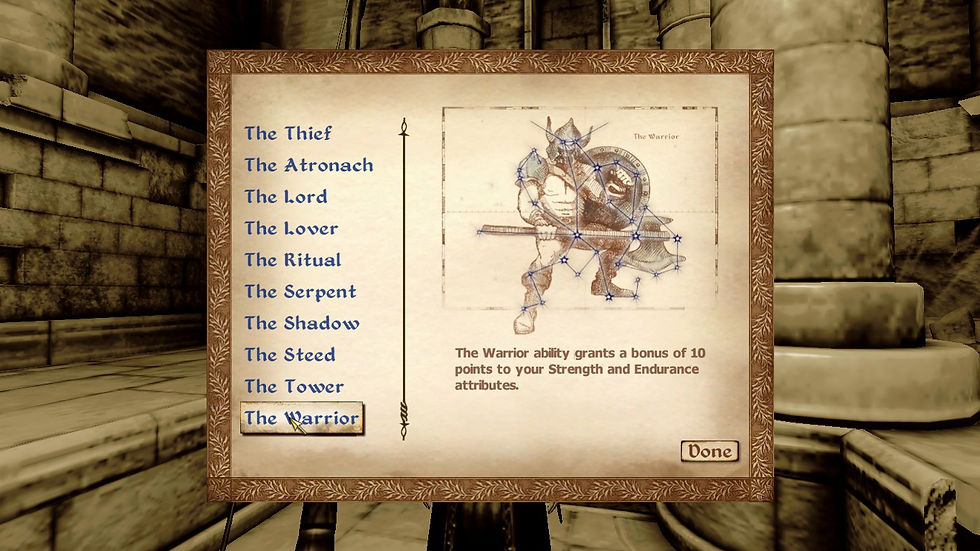
To level up, skills need to be leveled up. The game will give a notification for when it’s possible to level up.
When leveling up, points can be put into three attributes. Attributes do things like dealing more damage with physical weapons, increasing health, and so on. The more skills attached to a specific attribute are leveled up, the more points that will be invested into that attribute if it’s chosen.
Leveling up can be awkward though. Going to bed is required to level up, which is difficult to do in places like dungeons with barely any beds.
It’s also a steep road to level up things like health, stamina and magicka bars without a full understanding of how the level up system works.
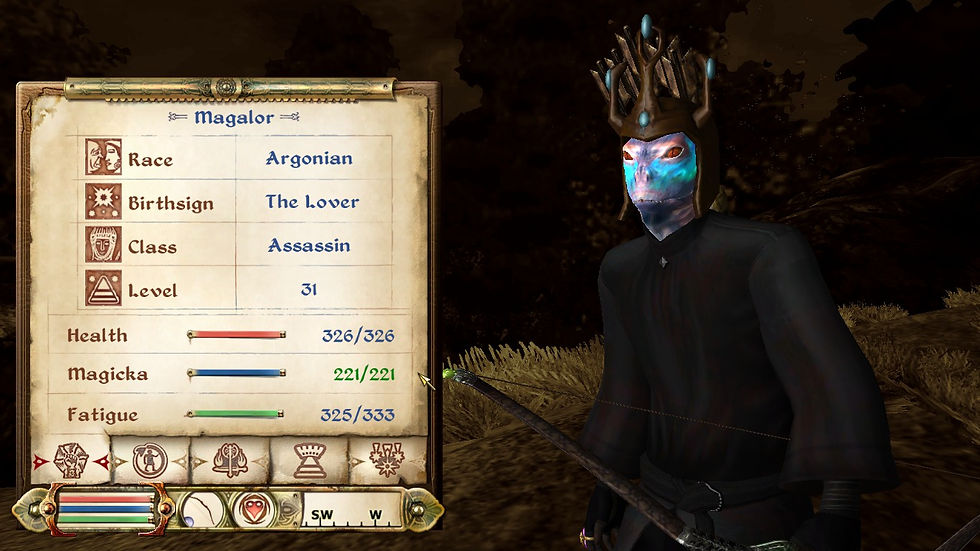
By the end of my playthrough, I only had 221 Magicka by level 31, and I eqipped an item that fortifies Magicka too.
A lot of spells were out of my reach because of this, even when I have a high enough skill levels to buy them and use them.
The game utilizes multiple styles of combat to level up skills, using the various weapons, magic spells, and stealth mechanics.
Want to fight head-on? Use a sword. Want to deal a lot of damage without fighting? Use stealth to deal six times the damage when successfully attacking an opponent. Want to make an ogre fall down a hill? Use a paralysis spell.
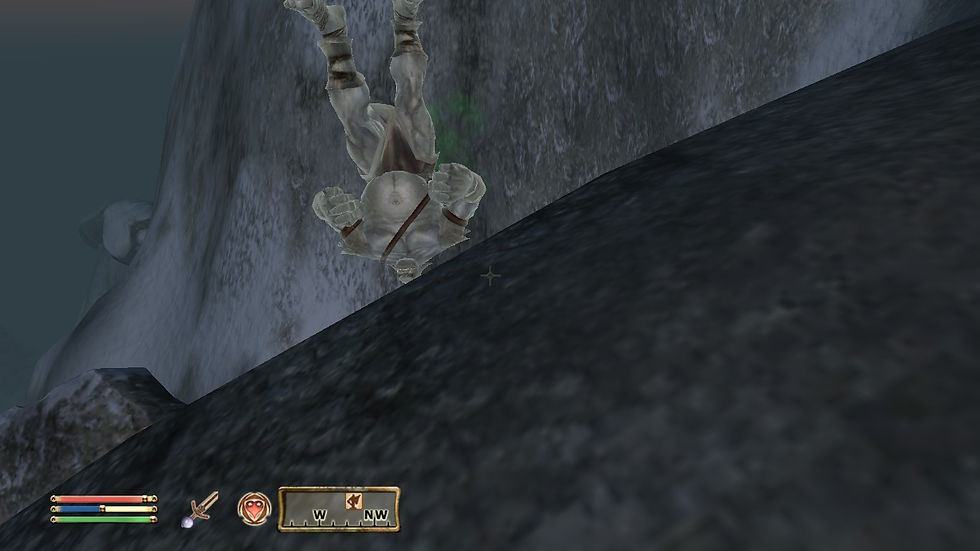
And that is only one way to make an ogre fall down a hill.
There are also companions to accompany the player to help with fights, although they aren’t recommended as their AI isn’t too bright. Sometimes they get in the way during combat.
It’s the worst with stealth since they attack any enemy in their eyesight which either isn’t stealthy, or my companion has a very different definition of stealthy.
Ironically, enemy AI can be both smart and dumb as enemies with projectiles aim for where the player is heading, whether then where they are. Other time they strike a conversation with you because priorities.
Overall, the combat is good with fantastic variety. However, some enemies can take a lot of hits before dying.
Enemies also scale with the player’s level. This is to keep their difficulty; however, it means even early enemies can still be a threat and creates less variety. This can make combat annoying and time-consuming.
This is showcased the worst with the Daedra and Oblivion gates.
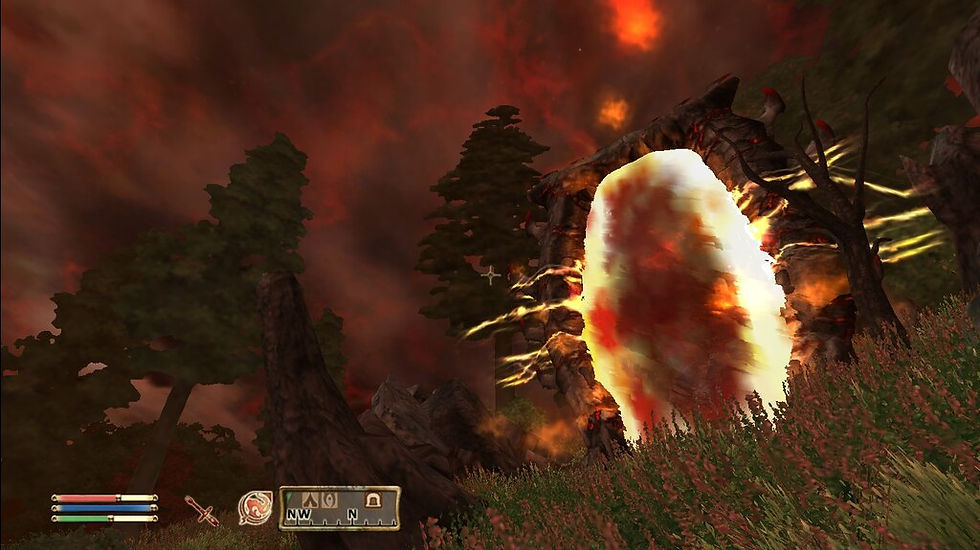
Oblivion Gates appear all over Cyrodiil, sometimes with Daedric enemies. When you enter an Oblivion Gate, your goal is to retrieve the sigil stone. The player will automatically exit the gate when they find it, closing the Oblivion Gate for good.
Oblivion Gates are repetitive with the same landscapes, enemies, and objective. Some of them can be a drag since finding the sigil stone is a pain.
There are a ton of Oblivion Gates that have enemies near them and turn the sky red, making them difficult to ignore.
Despite combat being a great portion of the game, the appeal of Oblivion isn’t in its combat or the realm of Oblivion itself. What makes the game shine is the amount of great mechanics the game has to make a truly immersive experience.
Houses can be bought in each city with their own furnishings and prices. There are inns to sleep in for a small amount of gold not only in cities, but outside of cities, having their own quests to complete.
Cities have their own law system where players can get fined or sent to jail if they break the law, such as attacking/killing NPCs, stealing items, and more.
Players can choose to either wear armour or normal clothing to immerse themselves in towns.
Players can eat food, like a human heart. Altars can be prayed to for temporary benefits, even after eating a human heart.
Potions are created using multiple tools and collecting ingredients all over the world. Weapons take damage whenever they’re used and need to be repaired with repair hammers, repair hammers can break randomly while repairing.
Doors and chests sometimes need to be lock picked through a minigame.
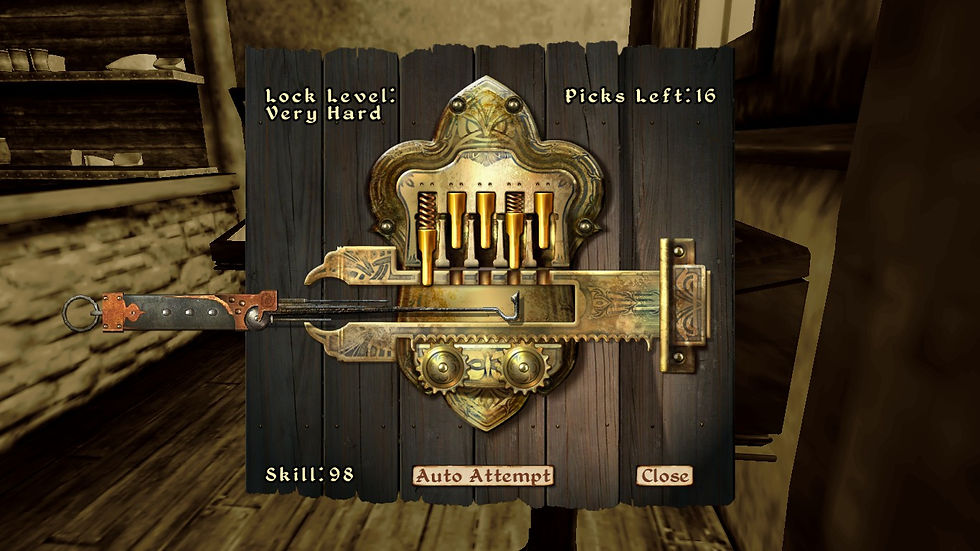
Weapons and armour can be enchanted with spells in the player’s inventory to increase stats or deal additional damage like fire damage. Magic spells can even be created that can combine two spells into one or make the perfect spell. These cost gold to create, however.
There are a large variety of spells: healing, shooting projectiles, conjuring allies, and more both in and out of combat.
NPCs can be befriended through a socializing minigame where they can be coerced, told jokes & boasts and admired. Bribing is available for fast friendship making, just like in real life!
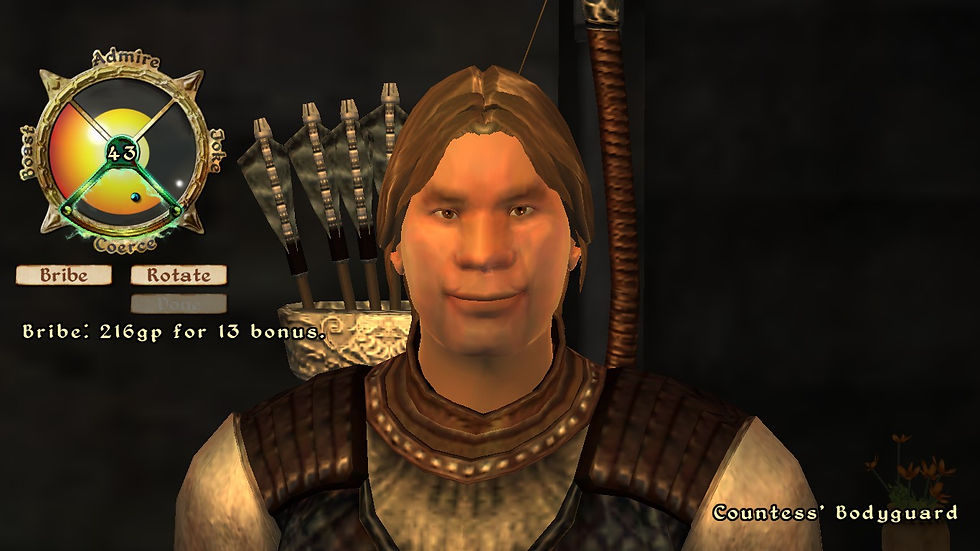
The inventory has multiple sections for items with multiple item types. There is also an encumber system where if too many items are being carried, the player will not be able to move until they lighten their load.
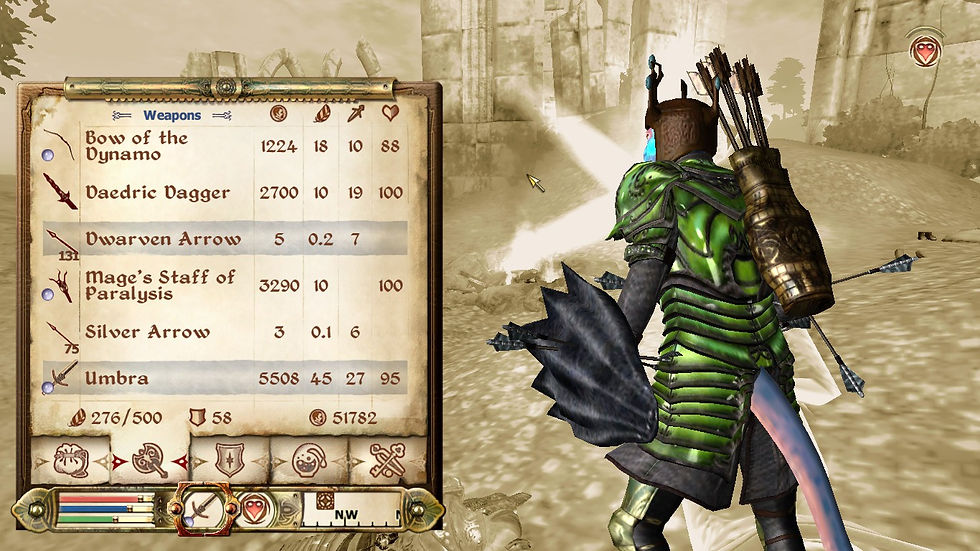
Many items can be sold and bought in stores, such as books, weapons, spells, etc.. However, merchants need to be haggled with to get better prices.
Players can choose to sleep in beds or wait in areas for up to 24 hours, which restores health, magicka and fatigue.
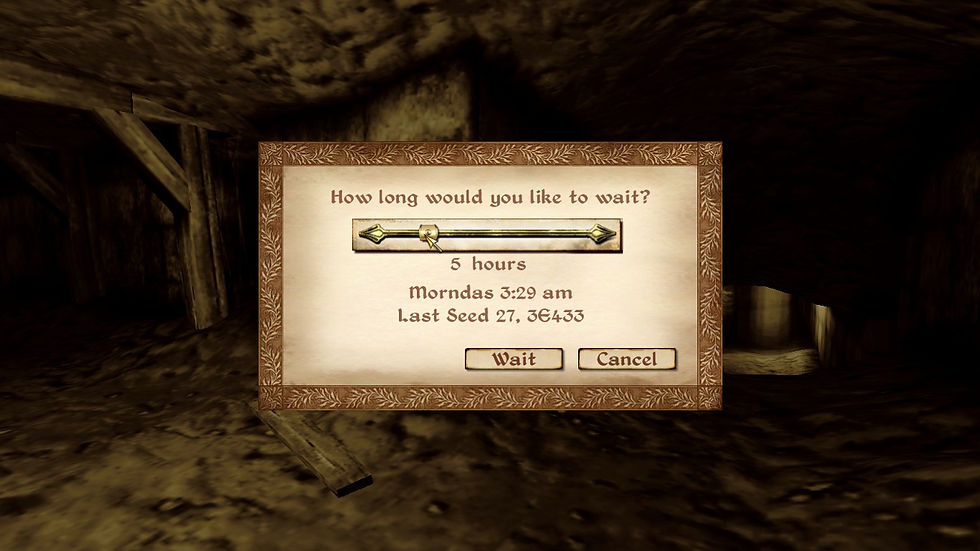
The player can also contract vampirism where the player can gain abilities and resistances, at the cost of taking damage when out in the sun and limits when waiting. There’s a quest to cure it but it’s no easy feat.
There is also a fast travel system to travel from location to another if no enemies are nearby.
There is a map for both the Shivering Isles and Cyrodiil, and maps for inside dungeons, which are drawn as the dungeon is explored, as if the protagonist is drawing the map as they’re exploring.
Exploring the world leads to discovering locations that can be fast traveled to. A horse can be ridden for faster traveling and as a companion to fight things.
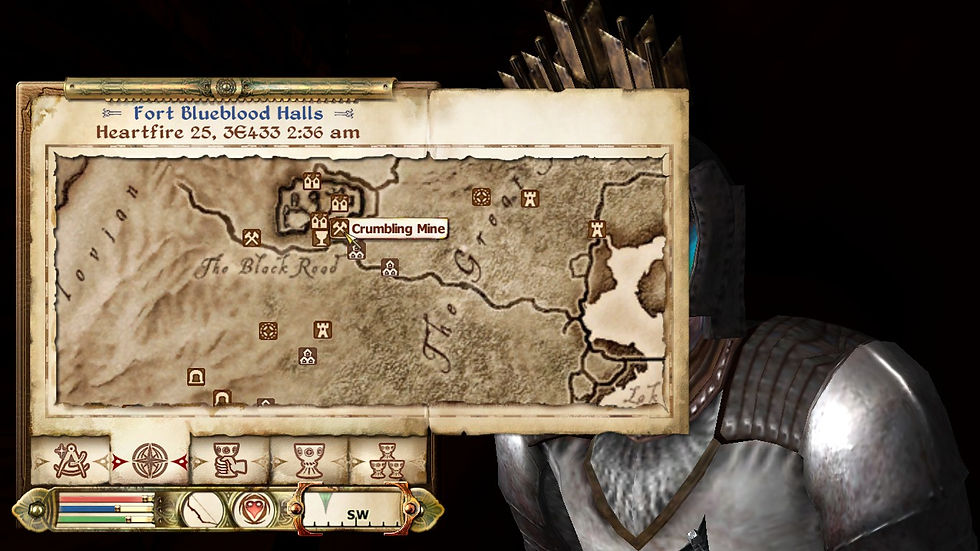
There are plenty of quests to do whether it’s side-quests or quests for factions like the Fighters Guild. Factions have their own rank systems, the more quests completed, the higher rank the protagonist has.
Many quests can involve fights, persuading people, stealing, or solving puzzles/mysteries.
Depending on which quests are done or how they’re done, the player may gain fame or infamy which will affect whether people see them as a hero or a notorious killer.

The rewards vary between gold, weapons, property, armour and whatnot. One reward is a wearable skull that fortifies two attributes, now that’s awesome.
All these mechanics make the game immersive and add so much depth to it, with good tutorials to ease the player into them. It might seem overwhelming, but some of these mechanics you're free to do never do like alchemy.
However, that doesn’t mean these mechanics are perfect. Some NPCs can report when they’re attacked to guards despite being nowhere near them. The only way to not be fined when killing someone is to instantly kill them, which isn’t easy.
Repairing items is frustrating until the armorer skill reaches level 50 since only by that point can the player repair enchanted items.
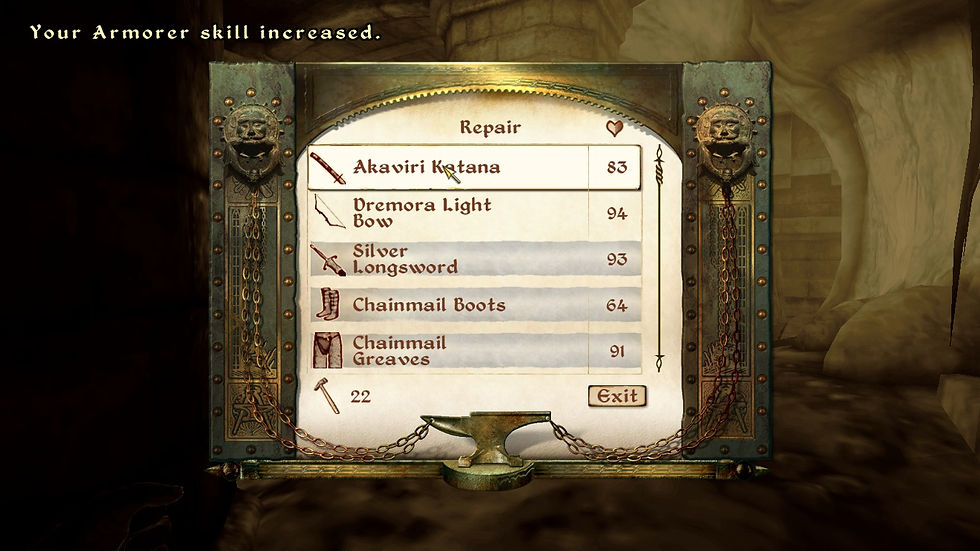
The socialization minigame can be bypassed completely with a custom charm spell that’s very powerful but works for a couple of seconds. Just like in real life! It's also odd that the major cities can be fast traveled to once the tutorial area is done, they’re never discovered oddly.
However, these problems were never a major hindrance and some of them even lend themselves to unintentionally funny moments.
Overall (S)
Oblivion, despite its problems, is phenomenal. The story is engaging, the world is immersive, the presentation is good and still holds up, and the gameplay is great if a little outdated. I have over 100 hours in Oblivion, but I still want to keep playing it.
Oblivion is no masterpiece by any means, it’s flawed and outdated in multiple ways. However, years later it still nails its most important aspect: creating an experience the player gets absorbed in and is hard to leave. Oblivion perfects the very essence of what a roleplaying-game is.














Comments